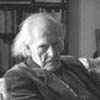
| R.S. Thomas
Ronald Stuart Thomas (29 March 1913 � 25 September 2000) was a Welsh poet and Anglican Clergyman, noted for his nationalism and spirituality. He was the best known Welsh poet of his day.
R. S. Thomas was born in Cardiff, the only child of Huw and Margeret. The family settled at Holyhead. He was awarded a bursary in 1932 to study at University College, Bangor, where he read Classics. In 1937 he was ordained as a priest, in the Anglican Church in Wales. For twelve years, from 1942-54, Thomas was rector at Manafon. It was at this time that he published his first book of poetry, The Stones of the Field.
In 1940 he married Mildred Eldridge, an English artist, they were to be married until her death in 1991. They had one son.
Thomas' poetry achieved a breakthrough with the publication of his fourth book Song at the Year's Turning which was critically very well received. It opened with a famous introduction by John Betjeman, one of his admirers. His position was also helped by winning the Royal Society of Literature's Heinemann Award.
He learnt the Welsh language, too late in life, he said, to be able to write poetry in it, and the sixties saw him working in a predominantly Welsh speaking community. He wrote two prose works in Welsh, Neb ('Nobody') an autobiography and Blwyddyn yn Llyn which translates as A Year in Llyn. In 1964 he won the Queen's Gold Medal for Poetry. He retired from the church in 1978.
Free from the constraints of the church he was able to become more political and active in campaigns that were important to him. He became a fierce advocate of Welsh nationalism, although he never supported Plaid Cymru because he believed they did not go far enough in their opposition to England.
He was a supporter of CND and espoused a brand of Christian Pacifism, although he did, in principle, believe in the fire-bombing of English holiday cottages. On this subject he said "what is one death against the death of the whole Welsh nation?"
He was also active in wildlife preservation and worked with the RSPB and other, Welsh, volunteer organisations for the preservation of the Red kite. Typically he resigned his RSPB membership over their plans to introduce non-native kites to Wales.
In 1996 he was nominated for the Nobel Prize for Literature. He lost out to Seamus Heaney. After his death at age 87, a memorial tribute was held in Westminster Abbey. Heaney, his friend, read the eulogy.
Almost all of Thomas' work concerns his twin passions, the Welsh landscape and the Welsh people. Underlying these twin themes are the politics. Even simple, lyrical descriptions of a hillside or a field can be read as a political statement. His views on the position of the Welsh people, as a conquered people are never far below the surface. His religious views, as might be expected from a clergyman, are also present in his works.
These concerns mark out his work as particularly distinctive and, perhaps, an easy subject for satire. The reader, though, is left in very little doubt as to the poet's sincerity and commitment. His earlier works focus on the personal stories of his parishioners, the farm labourers and working men and their wives. He shatters the cosy view of the traditional pastoral poem with harsh and vivid descriptions of life as it was lived in the valleys.
The beauty of the landscape, although ever-present, is never suggested as a compensation for the low pay or monotonous conditions of farm work. This direct view of country life comes as a challenge to many English writers writing on similar subjects. It might even be seen as a challenge to his more famous contemporary Dylan Thomas.
His later works were of a more metaphysical nature, more experimental and focusing more upon his spirituality. Laboratories of the Spirit (published in 1975) gives, in its title, a hint at this change in subject matter. Thomas described this shift as an investigation into the adult geometry of the mind.
He also experimented with publishing poetry alongside original artworks by other artists.
Despite his nationalism Thomas could be hard on his fellow countrymen. Often his works read as more of a criticism of Welshness than a celebration. He himself said there is a "lack of love for human beings" in his poetry. Other critics have not been so harsh. Al Alvarez said: "He was wonderful, very pure, very bitter but the bitterness was beautifully and very sparely rendered. He was completely authoritative, a very, very fine poet . . . "
Professor M. Wynn Thomas, said: "He was the Alexander Solzhenitsyn of Wales because he was such a troubler of the Welsh conscience. He was one of the major English language and European poets of the 20th century".
|
